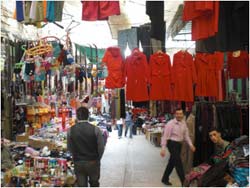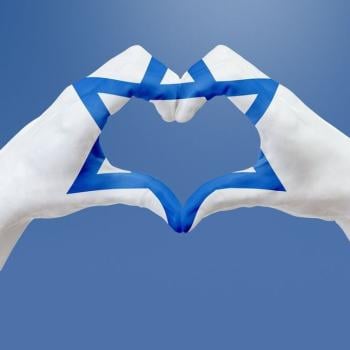Four days later, Israel will dispatch some hundreds of soldiers and police -- 3,000, according to Israeli press reports -- to evict the two families. Dozens of protesters will rain rocks, eggs, light bulbs, and curses at the troops, and thirty people will be injured and eight arrested.
Mainstream Israelis have little sympathy for the settlers, who are viewed as crazed fanatics. But there is still latent sympathy among many Israelis for a settlement movement that invokes old-line Zionist principles and idealism. "Most Israelis feel Hebron is very much part of our narrative because the patriarchs are buried there," says Hirsh Goodman, longtime military journalist and defense policy analyst at the Jaffee Center for Strategic Studies in Tel Aviv. "But the people who decided to settle there are not only on the fringe of Israeli society, but they're a despised fringe because of Baruch Goldstein and what he did."
Goodman says Israel's military leaders would love to shut down the entire Hebron settlement but can't get the government's approval. Still, after the successful recent eviction of the two families from the Arab shops, there are renewed signs that the government may clamp down. When settlers occupied a three-story building on the edge of the city last March, soldiers were dispatched there as usual the first night to guard the occupants. It looked like the settlers had succeeded in establishing yet another unilateral "fact on the ground." But the Israeli government recently announced it would support a Palestinian legal effort to have the settlers evicted. The case is pending before the Israeli high court.
Back on the tour, it's time for lunch, and the settlers lead us to the Gutnick Center below the Cave of the Patriarchs for cold drinks and soggy pizza. At 12:40 p.m. when the muezzin starts to broadcast his prayer for the faithful from the mosque, two loudspeakers atop the center burst into Israeli folk songs, seeking to drown out the Muslim prayers.
Sitting behind a vast polished desk in his office, Khaled Osaily, the mayor, is raising his voice. It's the week before the shopping center opening and Osaily's waiting room is filled with young men looking for any kind of work. He tells me not to be fooled by the occasional scenes of prosperity I'm seeing. Hebron is still on the brink of economic disaster.
"I need new schools, new buildings, and new roads," he says. "We need fifty schools and 1,000 new classrooms. Seventy-five percent of the population is under 25, but there are no sports centers, no infrastructure, no stadium, no playgrounds. We started building one sports hall with $1 million; we need $3 million to finish it. It would be the first in Palestine."
 Most of all, Osaily says, he needs the Israeli authorities to cooperate. "Go to the old city. I've asked the Israelis to please open the blocking gates. Hebron should not be divided."
Most of all, Osaily says, he needs the Israeli authorities to cooperate. "Go to the old city. I've asked the Israelis to please open the blocking gates. Hebron should not be divided."
Osaily is a political moderate who tries to dodge the Hamas-Fatah divide. Like Palestinian Prime Minister Salam Fayyed, Osaily is a modernizer who believes that a healthy dose of capitalism is the only way to win western support, get the economy off its knees, and make Palestinians believe there are rewards for moderation.
"We are serious people -- traders and merchants and hard workers," Osaily tells me. "If we had freer movement for people and goods, believe me, we would have more prosperity here."
The mayor's latest scheme is to offer each merchant in the old souk $200 per month for six months to reopen their shops. So far, he says, 800 have accepted, although the shopkeepers themselves say the number of re-openings is much lower.
One of those who tried to reopen was Jowdat Hassouni. For forty-two years he's owned and operated a modest kitchen supplies shop in the Bab El Baladiya, the old municipal square that marks the entryway to the souk. His is one of a row of a half dozen shops that have the misfortune of sharing a back wall with one of the Jewish settler compounds. At the corner of the row is a high wall sealing off a roadway and a concrete tower, manned by a red-bereted Israeli soldier.
Hassouni's shop has been ordered closed several times in recent years. Soldiers have never explained to him why the army considers it a security threat; terrorists presumably could blow a hole in his back wall and use it to fire upon settlers or to infiltrate the army's sterile zone. The fact he was here long before the settler compounds were built has no meaning to the soldiers. Mayor Osaily can pay shopkeepers to open their doors, but the army can close them again.



